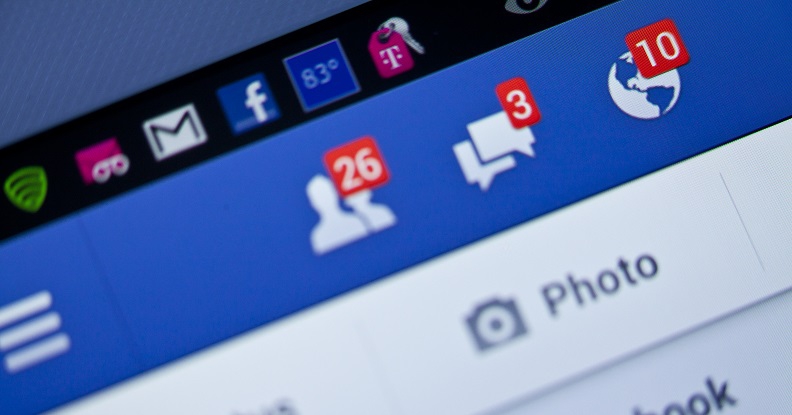
Can you remember where you were on the 4th of February 2004? For some people, it is a date that will pass them by without a second thought, but for one person, in particular, that date will remain in their mind forever. It’s the moment when it all changed. That person is Mark Zuckerberg, and that date is when his brand new website “Facebook” launched, and the rest, as they say, was history.
Speaking of history, we’ve pulled together all of the details and all of the information surrounding the history of the world’s most addictive website: Facebook. So sit back, grab some popcorn, and settle in for a Facebook history lesson. This is a long one!
To get us started, here’s a quickfire FAQ session:
- When was Facebook invented - Hotly debated topic, but the short of it is that Facebook was released in 2004, inspired by a previous website (Facemash) from 2003, which was inspired by another website called Hot or Not created in the year 2000.
- When was Facebook founded - The Facebook, or Facebook as we now know it, was founded on the 4th of February 2004.
- When did Facebook start - Facebook itself started in early 2004 as a social profile platform for just Harvard University, but over the next year, it launched to other universities and had over a million users by 2005.
- When did Facebook come out - Facebook’s world-wide popularity really began to pick up the pace from around 2007 onwards.
- When did Facebook become popular - Facebook has always been popular, but it was really by the end of 2007 that it was clear that Facebook’s popularity wasn’t just fleeting.
- When did Facebook take off - Facebook really began to see exponential growth between 2007-2009, growing from 20 million users to 300 million users.
- How long has Facebook been around - Facebook has just celebrated its 16th birthday!
Who is Mark Zuckerberg?
Writing a history of Facebook wouldn’t be complete without an introduction to the socially awkward computer nerd legend that is Mark Zuckerberg.
Zuckerberg, the baby faced, casual clothes wearing billionaire CEO, was born in White Plains, New York, on the 14th of May 1984, making him a proud member of the Millennials generation. That’s not his only member’s club allegiance, though. He’s also one of the top 100 most influential and wealthiest people in the world and has been since 2010, according to Time magazine.
Mark Zuckerberg is often presented as an accidental nerd-who-turned-gold, but his interest in computers and coding shone brightly from his early teenage years. He was privately tutored in coding from a young age, took college classes while still in high school, and learned a lot from his father about Atari BASIC Programming.
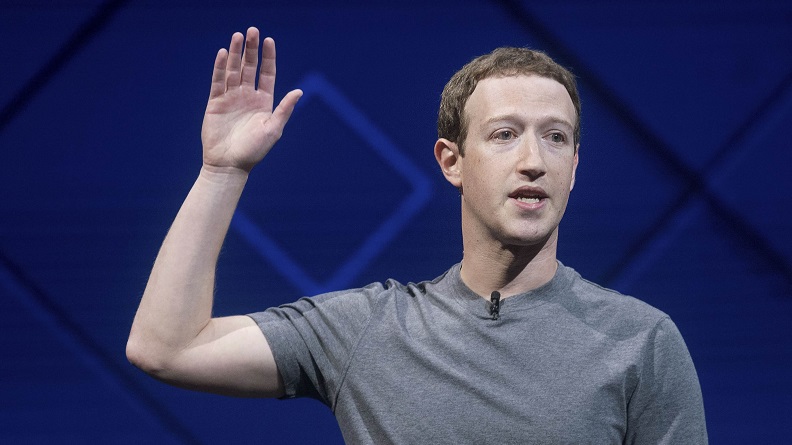
In the early 80s, computers were very rare in people’s homes, but the Zuckerbergs were amongst their first in their neighbourhood to get a home computer, fuelling young Zuck’s interest and desire for this brave new world.
Mark Zuckerberg’s interest in coding and programming was more than just a hobby. He was described as a ‘prodigy’ by his tutor and even helped his dentist dad out by creating an internal messaging system before messenger was even a thing.
His skills attracted the attention of some big players in the industry (such as AOL and Microsoft) who have never shied away from hiring excellent young talent, but Zuckerberg had his sights focused on Harvard to study psychology. We’ll dive more into that decision a little later.
Who Created Facebook?
The origins of Facebook are definitely a more than a little murky by today’s privacy-conscious mind, but back in the early 2000s, a website dedicated to rating the attractiveness of fellow college peers didn’t seem quite as #MeToo inducing as it does now.
Or did it?
Back in 2003, while still a freshman in college, Zuckerberg created a website called Facemash, to do just that: rate other college-goers on the basis of their perceived attractiveness. It wasn’t entirely his idea; it seems like it was heavily based on the then-popular website Hot or Not, which launched at the turn of the millennium.
It’s safe to say that a website dedicated to rating attractiveness of college students didn’t go down too well with Harvard’s Administration Board to which Zuckerberg was to be put in front of within a few days.
It’s not clear here whether their anger was due to the fact that the website idea ethics were particularly questionable, the fact that it had gained over 22 thousand photo views within a matter of days or, more than likely, that Zuckerberg had neglected to get permission from everyone to use their photos.
Regarding privacy issues, luckily it seems that Zuckerberg and Facebook have learnt from his previous mistakes with that one. Well, kind of. More on that later too.
Moving on from Facemash
Zuckerberg survived the grilling from the Administration Board and Facemash was taken down, only to be swiftly replaced in February of 2004 by the very first iteration of “The Facebook,” which does sound a bit like that time your uncle called it “The YouTube”!

The question of who founded Facebook is, in some ways, a bit controversial. There is no doubt in anyone’s mind that Mark Zuckerberg was the brains behind ‘The Facebook,’ but the initial concept is argued to have been a joint collaboration between Zuckerberg and three students with whom he worked on a similar project.
Those three students, Tyler Winklevoss, Cameron Winklevoss, and Divya Narendra, would later go on to sue Zuckerberg on the accusation that he ‘stole’ the idea from them. Although this was never proven, they all settled out of court in 2008 with 1.2m shares on Facebook each. By the time that Facebook went public and launched on the stock exchange, these shares were reportedly worth $300million each.
When was Facebook created?
Let’s head back to the birth of Facebook. The Facebook release date, although solid on the 4th of February 2004, doesn’t tell the whole story about the Facebook history timeline.
Facebook initially only launched to students at Harvard University as an online place for a social profile, something that at the time seemed like an alien concept for most people, but today feels almost alien without it.
The idea behind Facebook (and even the name) can actually be traced back to Zuckerberg’s time at the private Phillips Exeter Academy, where students would have an online directory with their photo and a few details about them. This was called “The Photo Address Book” and was quite a common thing at most private schools; many students referred to this as the ‘Facebook.’
It took under six months from the initial The Facebook website’s launch for it to become a fully-fledged incorporated company with a new headquarters in Palo Alto, California.
In 2005, $200,000 was spent on facebook.com’s domain name, and by the end of that same year, Facebook was boasting over 6 million active users on the platform.
When Did Facebook Go Public?
Things moved fast for Facebook over the next few months. Although Facebook was founded in 2004, it would take a few years for its popularity to surge fully across the globe.
The next move for Facebook was to expand to UK Universities and to high schools, Zuckerberg’s vision was to create a place for students of all ages to share their personal profiles, connect, and make new friends.
Arguably the biggest leap forward for Facebook would happen in September of 2006, just two years after it’s inception when Facebook opened to anyone over the age of 13.
Many people ask ‘when was Facebook available to the public?’ and, although Facebook was open to over 30,000 high schools and colleges a year beforehand, the decision to open the platform to the general public (provided they met the minimum requirements of a valid email address and be over the age of 13) was really the point that Facebook began to take off throughout the world.
The Golden Years: Facebook’s Rise In Popularity Across The Globe
In under a year of Facebook going public, the membership had grown from 12 million users in December 2006 to 20 million in April, 30 million in July, and by the time October 2007 rolled around, Facebook was nearly bursting at the seams with over 50 million active users.
2007 was a big year for Facebook, as most years were in the early days. 2007 saw the release of Facebook Pages and Facebook Marketplaces. The Pages feature was welcomed by businesses who, until now, had been using profiles to give their business a presence on Facebook.
By the end of 2007, Facebook was now home to over 100,000 business pages - a number that would rapidly grow in the coming years as being ‘on Facebook’ became a huge part of the marketing strategies for millions of businesses across the globe.
The next few years of Facebook flew by in a buzz of excitement, with a new international headquarters in Dublin, Ireland, opening in 2008, and of course, the introduction of Farmville, a virtual farm simulator game that had over 10 million daily active users at its peak.
Facebook’s growth continued over the next few years, hitting over 500 million users in July 2009 and 1 trillion page views in June 2011. Independent studies showed that Facebook had become the third-largest US web company with a value of $41 billion, only trumped by web-giants Google and Amazon.
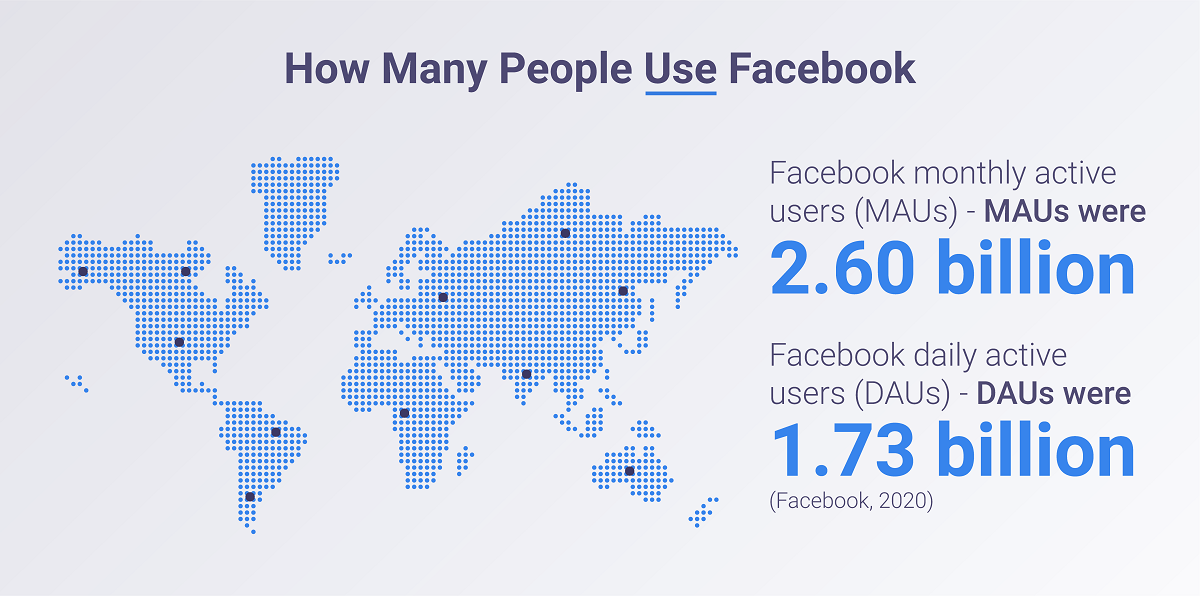
Enter Facebook Messenger (and WhatsApp)
Cast your mind back to pre-2004; a young Zuckerberg is trying to figure out a way to help his dentist dad communicate with this staff without the need to leave the room (or yelling over patients). Through hard work and a brilliant mind, Zuck was creating the foundations of something that would become widely recognized in years to come. He had created a chat service called ZuckNet.
ZuckNet would come back in a new form: Facebook Messenger.
In March 2011, Facebook acquired a group messaging app called Beluga. Beluga’s crowning glory was a working app for both Android and iPhone devices, which ran quietly in the background, allowing users to stay online all the time and send a push notification when they received a message.
Beluga was a popular and revolutionary service for its time, and Wired Magazine hailed it as the messaging service that Google Wave should have been. This made it a very important acquisition in Facebook’s messenger history. Arguably this was the most important acquisition Facebook made before WhatsApp in February 2014.
What Does Facebook Own?
So, what companies did Facebook buy over the years? The answer to this question is: many! There are, in fact, over 80 companies that Facebook has acquired or merged with between 2007 and 2020, and it doesn’t look like there is any slowing-down with Facebook’s thirst for acquisition.
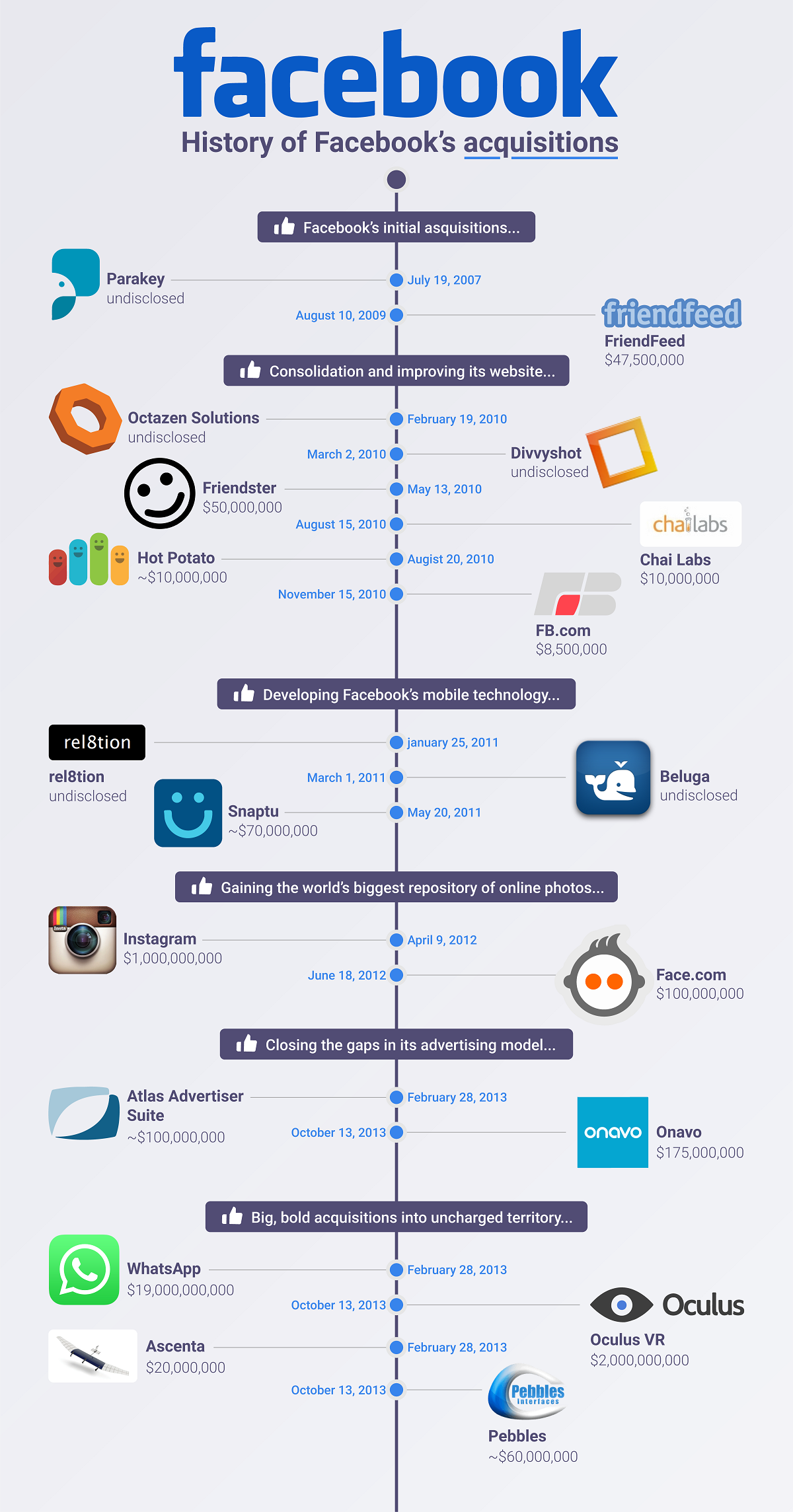
Some of the mergers and acquisitions have been more famous and more impactful than others, propelling Facebook to new heights at every turn.
Here are a few of the most impactful acquisitions that Facebook has made over the years.
Acquisition Date: 19th of February 2014
Acquisition Amount: $19,000,000,000
Integrated with: Standalone App
Background
Facebook acquired WhatsApp in 2014 after the service gained a huge amount of popularity with its end to end encryption of messages. In some ways, WhatsApp was seen as a rival to Facebook, especially the Facebook messenger service, boasting over 400 million active monthly users soon after its launch in 2009.
Facebook’s acquisition of WhatsApp had many at the time concerned about privacy and intrusive advertising, but so far, Facebook has kept WhatsApp fairly Facebook-free, but in 2018, Facebook finally launched WhatsApp Business, a messaging service for businesses to communicate with customers using a service they are inherently comfortable with.
In 2020, WhatsApp is now the reigning king of messaging services available on Android, iPhone, and as a Windows App, with many unofficial extensions.
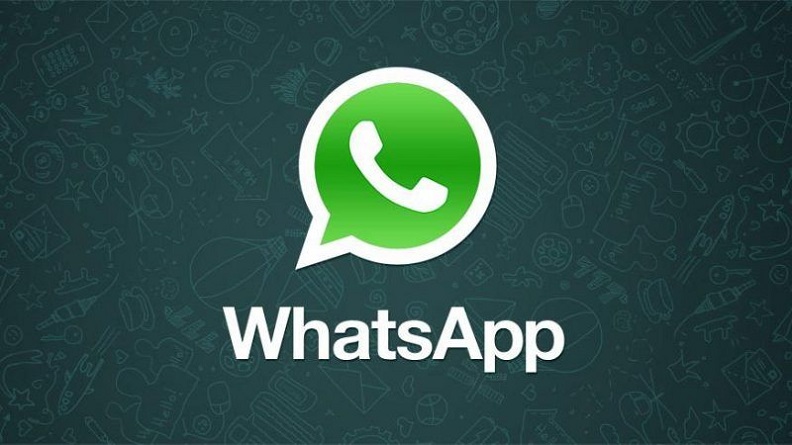
Acquisition Date: 9th of April 2012
Acquisition Amount: $1,000,000,000
Integrated with: Standalone App
Background
Instagram exploded onto the scene in 2010, as an app-only video and photo-sharing platform for iPhone, with an Android release following in April 2012, and a very limited web interface in November 2012.
The explosion of Instagram wasn’t missed by Facebook, as Instagram saw it’s monthly users expand to 10 million in just two months. The acquisition happened for a reported $1bn and again raised concerns about how Instagram would become part of the Facebook family, but so far, they have remained separate entities but very much holding hands.
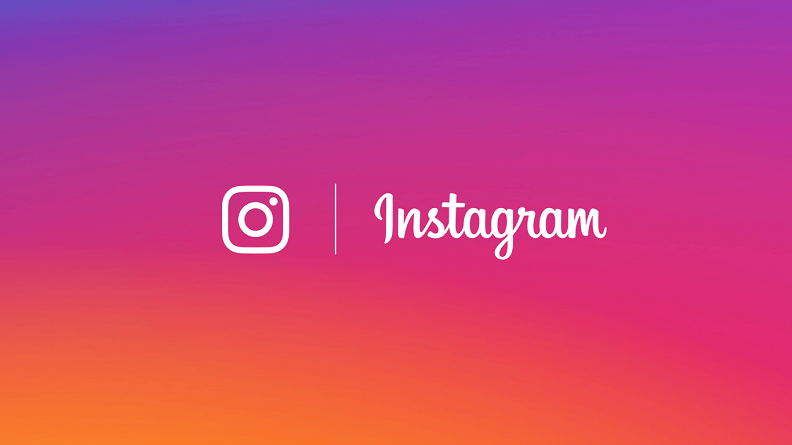
Oculus VR
Acquisition Date: 25th of March 2014
Acquisition Amount: $2,000,000,000
Integrated with: Standalone Service
Background
Oculus is a Virtual Reality (VR) technology that began as a Kickstarter campaign in 2012, with the aim to make virtual reality headsets that were affordable for average consumers and to really push the boundaries of virtual reality video gaming with specific infrared positioning systems and positional audio.
Facebook acquired Oculus in 2014 when only a prototype model had been released. Although this acquisition worried many potential users, as of 2020, the Oculus acquisition has been a great success for Facebook Inc.
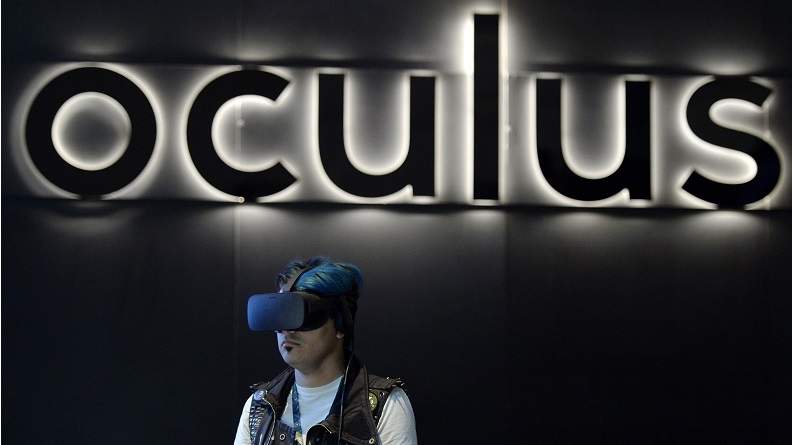
Giphy
Acquisition Date: 15th of May 2020
Acquisition Amount: $400,000,000
Integrated with: Instagram
Background
Giphy was initially founded in 2013 by Alex Chung and Jace Cooke as a search engine for gifs, and it gained over a million users in its first week alone. The most impressive feature of Giphy is the ability to integrate so well with users’ conversations on many messaging services, including Facebook Messenger and WhatsApp.
Giphy and Facebook had worked closely together in the past, Giphy being one of the first to integrate their services within Facebook Messenger, but Giphy became an official part of the Facebook family in May 2020 with a reported purchase price of around $400 million.
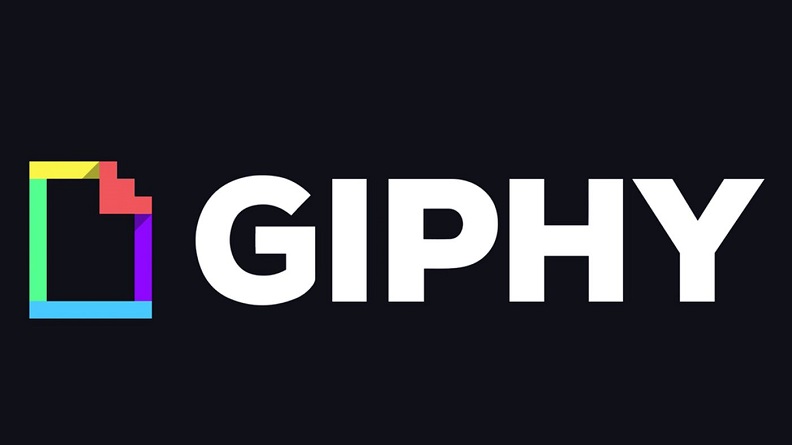
Privacy Issues and The Evolution of Facebook
The Facebook company history reads a bit like a series of lucky guesses and brave investments from its founding member and management team, but thinking back to the beginning of this article, you may remember we mentioned that young Zuck attended Harvard University to major in psychology?
When looking at this angle, the rise of Facebook may be seen as less of an accident and more of a well-planned road map by someone who had a unique insight into the human mind.
Brain Chemicals: A Brief Interlude
The brain works in many mysterious ways, but science has pinpointed a few chemicals that play a huge part in our fight or flight response, our response to a stimulus, and our ability to feel pain and fear.
Dopamine
Dopamine is sometimes called a chemical messenger; it is a neurotransmitter that transmits messages throughout the brain. Dopamine is responsible for our reward response system, giving the brain a little ‘hit’ of pleasure every time we do something that increases the dopamine. It is a highly addictive substance and plays a big part in the body’s response to a stimulus. Dopamine is also well known to create the chemical norepinephrine, which is, in turn, converted into epinephrine, which is needed to propel the body into action and movement.
Serotonin
Serotonin is most commonly called a neurotransmitter (like dopamine), but it is also considered to be a hormone. Serotonin gets the reputation of being the ‘happy chemical’ due to its role in the feeling of pleasure. Humans (and animals) who are high in serotonin experience a feeling of power and dominance, causing them to stand up straight and giving them the ability to push through, which is, in turn, understood by those of lower status in the dominance hierarchy.
Oxytocin
Oxytocin, similarly to serotonin, is nicknamed the ‘love drug’ and is a hormone that’s released by the brain when people are happy in social situations. Oxytocin is produced by the pituitary gland and is usually stronger in women than it is men.
Endorphins
Endorphins are a group of hormones that are produced by the central nervous system and the pituitary gland. Endorphins are known as the body’s happy drugs and work to ignite the opiate receptors of the brain (the same parts that are ignited when we take opioid-based medication or recreational drugs such as morphine or heroin).
Adrenaline
Adrenaline is a hormone released by the adrenal gland, it’s sole purpose is to flood the body with energy and alertness for a short burst of time. Most commonly associated with the ‘fight or flight’ system, adrenaline will help people stay calm and focused in an incredibly stressful or exciting situation.
Cortisol
Cortisol is known as the stress hormone and is another hormone released in response to the body’s fight or flight threat reaction. Both adrenaline and cortisol should dissipate rather quickly once the threat has abated, but too much cortisol, or high levels of continuous stress, can have negative effects on the body.
So what is the relevance of all of this brain chemistry to Facebook and Mark Zuckerberg’s never completed psychology major?
The answer lies in how Facebook (and now other social media platforms) interacts with the brain and the body, causing a change in brain chemicals. It can be argued that it was all planned by someone who had a unique insight into the psychology at work behind the chemical reactions.
There are two main parts of Facebook that cause a combination of brain chemicals to merge, which, in turn, is causing what psychologists have now dubbed as ‘social media addiction.’ The Fear of Missing Out (FOMO) that many feel when they realise they haven’t scrolled through their feed for a moment of time, combined with the instant gratification of likes and an ‘always on’ society are these two main parts.
The instant gratification of Facebook and social media has a direct response on the brain, causing a mixture of the four ‘happy’ chemicals, endorphins, dopamine, oxytocin, and serotonin, and as we discovered earlier, these chemicals are incredibly addictive.
No, we’re not comparing Facebook to recreational drugs or other destructive addictions, but behind the likes and the fun ‘debates’ that users find themselves part of, Facebook and social media becomes another way for the brain to increase the levels of dopamine and other happy chemicals.
The downside of this is that the brain becomes used to getting these little happy chemical hits, and we know how to create them - by going on the feed, liking photos, interacting with friends, etc. Of course, the flip side to this is that the FOMO kicks in when we know that this hit isn’t possible. It’s that little panic you have when you realise you’ve left your smartphone in another room for a few minutes.
This concept of the brain’s reward system response to social media is explained beautifully by inspirational speaker Simon Sinek in his 2013 talk and book Why Leaders Eat Last.
Facebook’s Response to Social Media Addiction
Facebook is well aware of the addictive properties of social media. The design principle behind Facebook and Instagram especially was always to encourage users to spend as much time on the platforms as possible, but in recent years that has become both a PR and a user nightmare.
Facebook has seen its userbase become more and more concerned about social media addictions, online bullying, and of course, privacy. The problem is so widespread that Facebook saw it’s users drop off by 15% in the two years running up to 2018.
There were many reasons for this drop-off. Some attributed it to the various privacy scandals, like Cambridge Analytica, the apparent interference in the 2016 Presidential elections. However, some could put it down to the plain fact that many of Facebook’s early millennial users have now turned into the parents of kids who are seeing Facebook as a platform their uncool parents use.
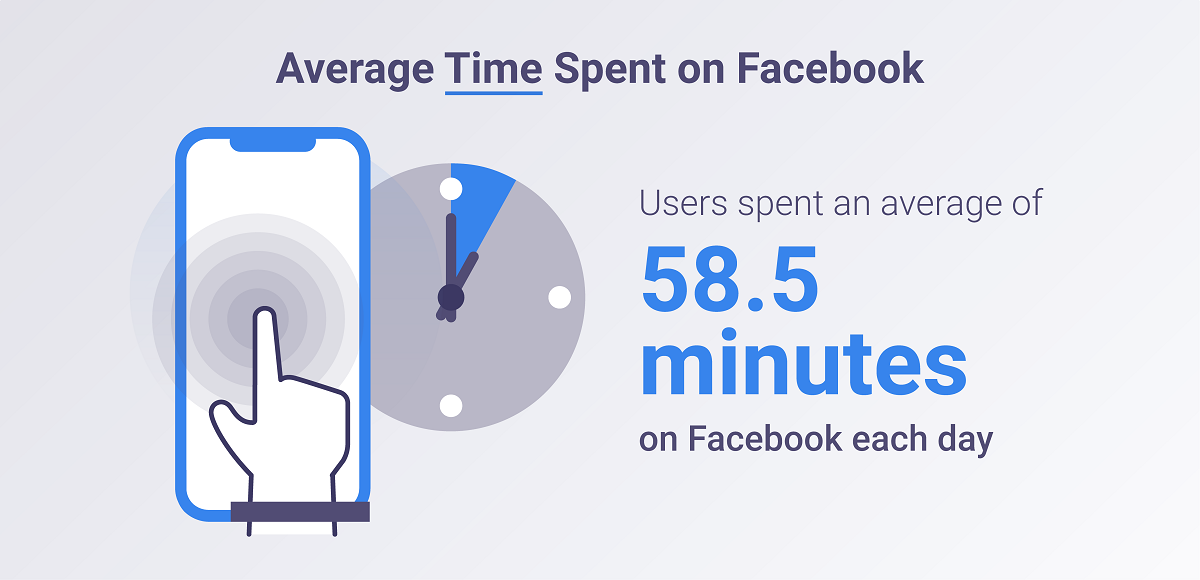
Facebook has done a lot over the years to ensure that users feel safe on the platform, but it’s their concern over social media addiction that is one of the most important developments. Put simply: Facebook wants you to spend less time on Facebook.
A relatively recent development for Facebook was the integration of “Your Time On Facebook,” a section of the app dedicated to showing users how long they were spending on the platform per day and a place where users can set healthy limits.
Some of Facebook’s other digital wellbeing interventions include:
- Options to be able to unfollow (but remain friends with) people whose posts you don’t want to see
- Report distressing content, such as graphic violence or child pornography
- Report people who may need some help, such as those who are suicidal or posting content relating to eating disorders or extremism
- Providing source info on links shared to aid in the fight against Fake News
- Disaster response options to let loved ones know you are safe
- The ability to mute conversations in Messenger, WhatsApp, Instagram, and even mute responses to an entire topic feed
This attention to digital wellbeing is being followed by many of the big tech companies, including Google, who implement many features in their search to respond to users such as bringing up helplines where users can access support if their search term flags up that they may need help - try searching Google for ‘how to make a noose,’ and you’ll receive a suicide prevention helpline as your first result.
Google, like Facebook, are becoming aware of the very real danger that ignoring digital wellbeing presents, and they now have a whole suite of services to help support users on both the google and Android platforms.
Facebook’s Response to Privacy Issues
It is almost impossibly to cast your mind back to a time when Facebook didn’t exist, when it wasn’t plastered on every business sign, or when you didn’t have your mum liking every photo of you when your school friends weren’t trying to drop you messages inviting your to their newest MLM business (we’ll pass, thanks), and back to a time when privacy really was private.
When Facebook opened up to the world in late 2005, it was perhaps difficult to tell that this little sharing platform would become one of the biggest collectors of data on the planet. Even Google, whose mission it is to ‘to organize the world’s information and make it universally accessible and useful’ admits that it’s own ads platform isn’t as accurate as Facebook’s own ads targeting platform (which Google suggest in their Digital Garage Workshops, is around 97% accurate).
There is, of course, a huge downside to a platform that boasts a user base of nearly a quarter of the Earth’s population, and that is how that data is used and managed, and how other companies have access to that data.
In 2018, Facebook faced a huge allegation for privacy breaches when the Cambridge Analytica story broke. Cambridge Analytica is alleged to have mishandled users’ data that was scraped from their Facebook details through an app called This is Your Digital Life.
While the sharing of Facebook information wasn’t something that was a new concept, the issue arose when it was alleged that Cambridge Analytica mishandled the information and allowed it to be used for political purposes in support of many campaigns such as the Vote Leave campaign for Brexit and the 2016 Presidential Elections.
The whole scandal wiped $70 billion from Facebook’s stock value, caused the UK’s Information Commissioner’s Office to issue a $663,000 fine to Facebook for breaking privacy regulations, and saw Mark Zuckerberg himself hauled in front of Congress in the US to answer for his company’s actions.
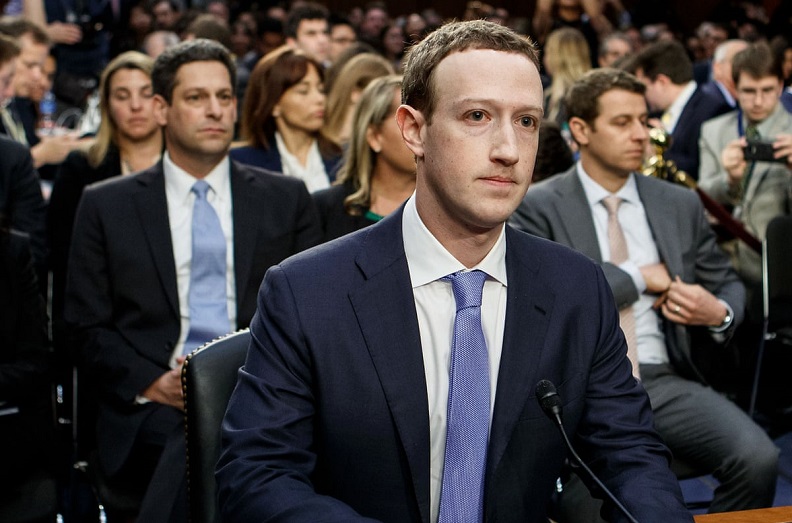
It seems like from that moment on, Facebook has taken an even stricter approach to the privacy of its users. It has been very strict about which apps can use which data, ceasing any partnership with Cambridge Analytic immediately and subsequently stopping communications with other higher-risk apps and services.
Thanks to these major concerns over privacy, users are now regularly reminded about what they are (using push notifications about ‘privacy checkups’), and when users make public posts, they are reminded that everyone will be able to see these. While this doesn’t mean that old wounds are fully healed, Facebook’s problems today do seem to be getting better, and, at least outwardly, it seems like Facebook is listening to both it’s users and wellbeing campaigners.
The Huge Facebook Algorithm Change of 2018
2018 proved to be an important year in Facebook’s history and can be seen as an almost ‘coming of age’ for Facebook and their team. Zuckerberg was now a married father, and concerns about privacy and the effect of social media on younger users and communities were becoming an ever more apparent issue.
In February of 2018, Facebook announced that it would be updating its algorithm to promote better engagement and, as they put it ‘meaningful engagement’ on the platform.
This change of algorithm was welcomed by privacy and mental health campaigners because it seemed that Facebook was finally addressing the issues that they had been raising for a long time. However, the change came as a huge blow to many businesses that used Facebook as part of their marketing tools.
One of the biggest changes that Facebook made was to downgrade business pages. Although business pages are still a very much big part of Facebook’s ecosystem, they announced that the pages’ updates would only appear in a user’s newsfeed if they have specifically liked the page and had interacted with the page’s content previously.
What that meant for users was that their feeds were tidied up from the constant promotional content from any business whose page they had liked on a whim and never engaged with since, and more posts from friends and finally and groups were showing up. A great win for Facebook’s private users, but a huge blow to small (and large) businesses who saw their engagement rate plummet almost overnight. Some have never recovered.
This massive algorithm change that hit both Facebook and Instagram at the same time has been dubbed by marketers as the day that organic reach died. It seemed that from here on in Facebook was not a supporter of small businesses, and it was only going to help if the business was using paying for ad space.
One may wonder what the purpose behind destroying organic reach for businesses was, but in Facebook’s mind, they were aiming to help users become more connected to what actually matters, and reduce what they saw as ‘clickbait’ or ‘engagement bait.’ All of those business page posts that encouraged users to engage using bait styled messages (like the famous “for a chance to win, share this post and tag your friends!”) suddenly found that their posts were not being shown to as many people as they once enjoyed.
If we look at this from a more market-driven perspective, though, it’s obvious that the change in the Facebook algorithm was due in response to the various scandals that they had faced over the years. A sure-fire way for Facebook to appear more business-minded was to clear out the low value and fake profiles and businesses.
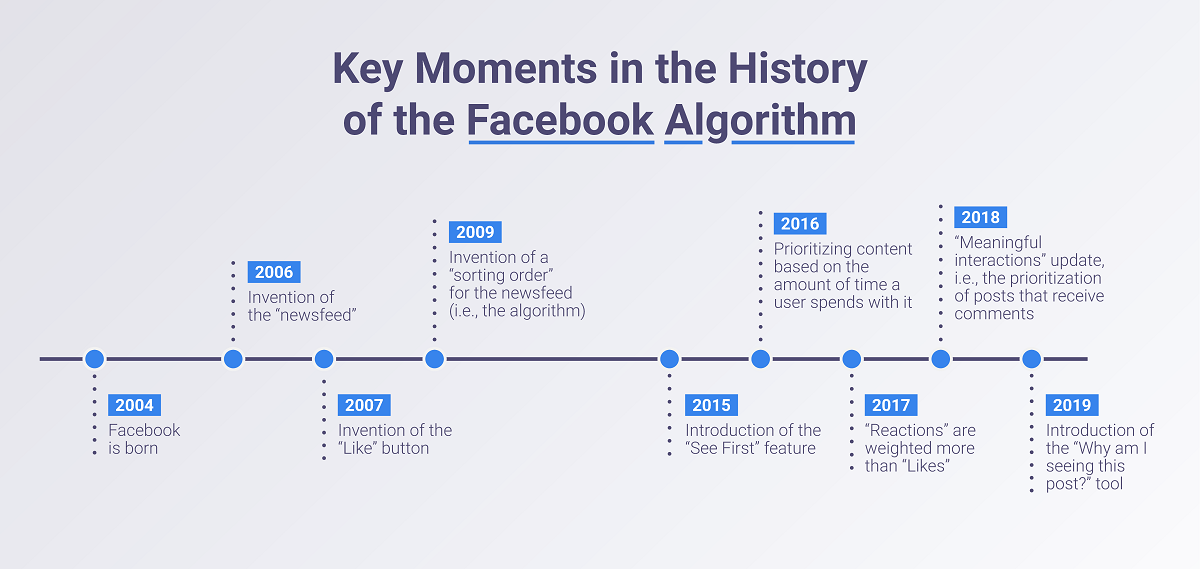
How Much Is Facebook Worth Today?
Facebook’s stock history had been a fairly smooth affair until the Cambridge Analytica scandal. Opening at just $38 per share, Facebook now commands around $225 a share and has seen its net worth grown exponentially from around $50 billion to over £660 billion today.
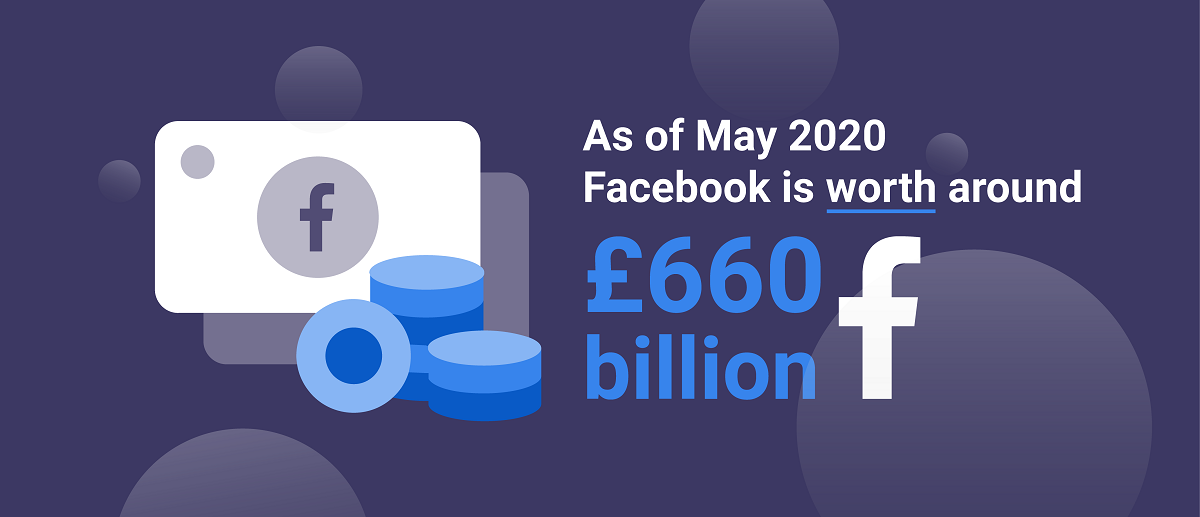
There have been some sharp falls in Facebook’s stock history, over $200bn was wiped off of the market capitalization between July 2018 and November 2018 while the privacy scandal raged.
This fall was quickly gained back again, and another big fall wasn’t seen until February this year when Facebook’s value dropped by $150 billion when it was embroiled in the scandal of fake news surrounding the COVID-19 global health pandemic.
Neither of these big falls lasted long, and Facebook has continued an upward trajectory and is safely back to more now than at the beginning of 2020. Facebook now sits behind Alphabet (Google’s parent company) in terms of capital value.
Summary
Facebook has seen many changes over its 16-year history. The vision of connecting the local University population of Boston has exploded into a goal of connecting nearly a quarter of the world’s population. For context, 22% of the world’s population is on Facebook (as of 2018), and only 59% of the entire world population has any internet access at all.
It’s estimated that developing countries are where Facebook will see the biggest growth in the next five years, with an estimated 250 million users expected to join Facebook between 2019-2023 from developing nations.
Facebook has over 48,000 employees, stretched across the globe, helping to look after the 1.73 billion people who log into Facebook every day. They have released many features to help users with their every day lives, such as photo hosting and tagging, groups, events, market places, job-hunting tools, and Facebook is even taking the time to dabble in the very delicate field of online dating, with its own app within the app, Facebook Dating (currently unavailable in the UK as of May 2020).
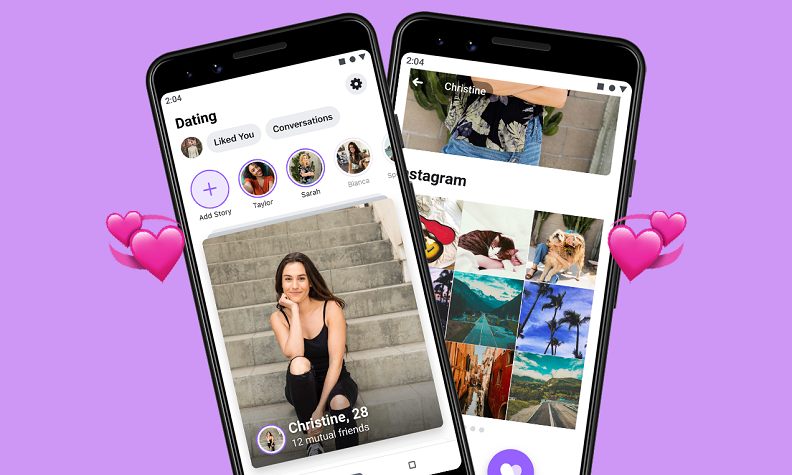
Facebook Ads platform has helped millions of businesses to grow and reach new audiences with their highly accurate targeting system, and ad revenues for Facebook are reported to be around a staggering $17.44 billion.
It’s obvious that Facebook has changed the way we interact. Our ‘online lives’ and our real lives can now merge and find some kind of happy medium on the platform, and with all of the extra services that Facebook is adding almost daily, it seems that our reliance on the social media giant is not waning any time soon.
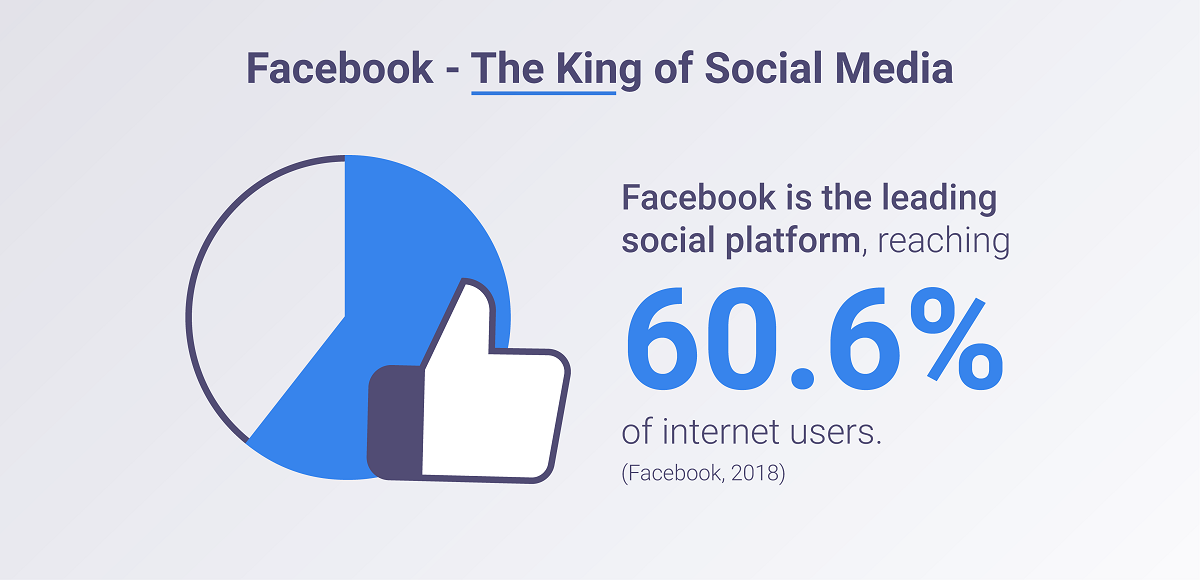
Despite its many critics, Facebook has shown itself to be an important part of the culture of Western societies and, as many other societies open up to the world, Facebook will be there to nurture the relationships between people, the relationships between businesses and people, and maybe even the relationships between countries.
It’s been an exciting 16 years, and we’re really looking forward to seeing how Facebook develops in the coming decade, and how the user experience will develop alongside it.